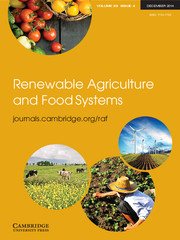Article contents
Meeting market demand in the organic sector: Handler–supplier relationships in the face of tight supply
Published online by Cambridge University Press: 27 May 2009
Abstract
Periodic shortfalls of organic food have been commonplace in the USA. Shortages, created when demand grows faster than supply, have been exacerbated by relatively slow growth of certified organic farmland (in comparison to growth in retail sales) over the past decade. Organic intermediaries, referred to as handlers in the US national organic standards, work with farmers and other handlers in moving organic products along the supply chain, and are often the first to feel the effects of tight supplies at the farm level. These firms have a variety of mechanisms available to procure needed ingredients when organic products are in short supply: contracts with suppliers, encouraging suppliers to transition to organic, working with suppliers to increase their output, working with new suppliers, providing technical assistance with organic standards and production methods, and making less than load shipment arrangements with suppliers. Survey data collected from certified organic handlers are used to identify characteristics that make it more likely that an organic handler will undertake activities with suppliers to affect the supply of organic products. Handlers most likely to work with their suppliers had been in business for longer periods of time, bought from growers or grower cooperatives, and were more likely to be wholesalers. Handlers who consider price as important were less likely to undertake activities with their supplies to increase the supply or flow of organic products.
Keywords
- Type
- Research Papers
- Information
- Copyright
- Copyright © Cambridge University Press 2009
References
- 10
- Cited by


